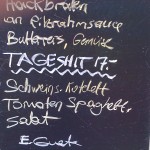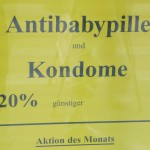An introduction to Swinglish
July 16, 2010, 13 Comments
In my beginner’s guide to Swissness, I suggested that learning Swinglish was one way to become more Swiss, so here’s a guide to the first few steps.Contrary to official pronouncements, there are in fact five national languages in Switzerland. Alongside German, French, Italian and Romansh, there is also Swinglish, the product of Swiss meets English. It may be less developed than its linguistic cousins Franglais and Spanglish but, within its home country, it’s widely spoken and widely (mis)understood. And when I talk about Swinglish I don’t mean the liberal sprinkling of English words that appear in normal Swiss speech (such as ticket, sandwich, quickie, and management). Or indeed in some of the pictures below, all to be found in Bern. Are the haircuts at The Crime Edge so bad? They can’t be any worse than the Special Flakes, which really aren’t that special. And unless I’m Imelda Marcos, they can’t all be my shoes in that shop.
There are some true Swinglish examples in the gallery below. An Antibabypill does exactly what it says on the packet. This is when Swinglish is at its easiest for foreigners: when the meaning is clear from the words, even if they aren’t ones we’d readily use in English. The language becomes harder when the Swinglish words have completely different meanings from their original English root. For example, a Hit can be a special offer, as in Dish of the Day or Tageshit, which isn’t so appetising for English speakers. Or a mobile phone is known as a Handy in Swinglish – an appropriate enough word but with a totally different meaning in English, where it’s not even a noun.
At this basic level, most Swinglish words are there for two reasons. Firstly, it is cool. Using an English word is so much trendier than a dull old Swiss one, especially when trying to sell something. Secondly, it overcomes the language barrier. It’s much easier to use one English word, such as Sale, which can be understood by everyone, than translating it into four separate words; it saves space as well. Swinglish is thus at once both hip and helpful. A good everyday example is the word Drink, which in Swinglish roughly means semi-skimmed milk; in any Swiss supermarket there is Milch (or lait or latte), the real deal with all its fat intact, and then Drink. To a native English speaker, this usually means that it’s been watered down and/or sweetened up (the dreaded ‘fruit juice drink’); for Swinglish speakers, it merely means milk that is not whole (as in it’s lost some of its fat). Using an English word makes it appear trendy, and so more marketable, and avoids translating ‘semi-skimmed milk’ in triplicate.
The trouble for foreigners is that when the Swiss speak English, some forget that many of the words they’re using are actually Basic Swinglish. No problem when they’re self-explanatory even if mis-spelt, eg (k)now-how, but just as American and British English have different meanings for pants, purse and rubber, so too can Swinglish and English produce moments of mutual misunderstanding. So, a few examples with the Swinglish meanings:
- Hit – a special offer; it comes after, and is joined to, the word it is qualifying, eg the Dish of the Day is Tageshit. Not too appetising for English speakers (see slideshow)
- Mobbing – bullying, usually within the workplace
- Old-timer – a vintage car, but also buses and trams, though not men
- Pudding – a specific dessert rather like a blancmange
- Smoking – a dinner jacket
- Tip-top – very good
- Trainer – a track suit
- Wellness – a spa, normally used as an adjective, eg wellness weekend or wellness hotel
At a more advanced level, Swinglish is easier for outsiders to understand simply because Advanced Swinglish speakers usually speak good English but their Swinglish roots reveal themselves every so often. It’s not always a question of vocabulary, as most Advanced speakers have learnt to drop (or translate) many Basic words. At this level the most noticeable quirk is the grammar. Many nouns develop a plural where none existed before (informations, behaviours) while other plurals pop up with odd spellings (ladys, partys). Verbs present more of a challenge. Swinglish speakers do an awful lot of things reflexively – dressing, hurrying, shaving, imagining, remembering and sitting down are all things you do to yourself. The problem lies in the mid-translation of the reflexive pronoun. In Swinglish, we meet us, I shame me, and we see us are all often heard. Then there’s the use of the continuous tense, which most Swinglish speakers do with relish, possibly because it doesn’t exist in Swiss. ‘Are you speaking German?’, said in perfect Swinglish, is a question designed to confuse everyone involved.
That’s it, until we are seeing us next time in Switzerland.


















 Follow on Facebook
Follow on Facebook Follow on Twitter
Follow on Twitter Subscribe by RSS
Subscribe by RSS Contact me directly
Contact me directly Global Solutions Inc.
Global Solutions Inc.
13 Comments on "An introduction to Swinglish"
I love your site and I am going out Monday and buy your book. I forgot to look for it today when I was in Barnes & Noble.
I want to live in Switzerland but cannot unless I have a job there and finding a job there seems to be next to impossible. I am a teacher but an USA citizen and I do not speak anything but English. Trying to learn Spanish but it is going to take awhile. Then I want to learn French.
I hear that Switzerland is very expensive. How true is that?
If I were to visit there, what would be the most inexpensive way to do that?
I have put your radio talk show about books on my fastdial and will listen often. I like your British accent.
Janie
Nice write-up about something that is very much omnipresent in Switzerland! For additional examples, check out my post “Swinglish 101 (The Swiss Say the Darnest Things)”: http://newlyswissed.com/?p=144
Wow! That’s interesting since in Polish we use the exact same words for exactly the same meanings. Well, we just don’t use the word “trainer” at all and “mobbing” for us is the crime of persecuting a person at a workplace. Still – “hit”, “old-timer”, “pudding”, “smoking” and “tip-top” stay exactly the same :-))) I wonder why…
A great site that is full of familiar and humurous senarious for me, as an Australian, and my Swiss husband. I am married to a Bernese Oberlander and lived in Zuri for 4 years, so can relate to most of your Swiss observations and adventures. I am also an English teacher – now business owner – and found you while doing a bit of research on what’s out there under “Swinglish”. I am writing a small blog entry on how our family perpetually lives, communicates and functions in ” Swinglish” – a mixture of Swiss german and English – not finished yet though!
Anyway, Interesting you should mention the passionate use of present continuous as my daughter – aged 4 – takes Swiss german verbs such as Schlafa and comes out with I am schlafa-ling…. She is seck-ling and so on.
Sarah
Thanks for making me laugh. Have u heard of “partner look”? I love this one – it is when you turn up to an event, dinner or something dressed similarly to your partner, whether it’s intentional or not.
Wheni was looking really puzzled, my husband’s friends were saying to me “you know, partner look…it’s English” haha, gotta love the swinglish!
Very nice blog and books!
I’m also amazed by the Swiss grammar construction of English sentences!
The most typical which is always astonishing me is for example: “according the rules” instead of the Oxfordian “according TO the rules” or the Cambridgean “in accordance WITH the rules”.
For sure! In Swinglish this is perfectly correct. When you translate from German to English….”gemäss der Regeln”, without any preposition between “according” and the object.
But at school they always taught not to literally translate from your own language to English, didn’t they?
Maybe in Switzerland not: here they seem to be sometimes allergic to the “written” words, and rely just on verbal communication!
Diccon, I really like your books and website.
I have started a blog on Swissinities, typical Swiss curiosities (geoch1.wordpress.com). Of course it’s poor and crap, but I would be glad if you had time to have a look and let me know your precious thought!
Thank you very much
Regards
Andrea
If Tageshit seems unappetizing, explain what a “tage” is.
Trackbacks for this post